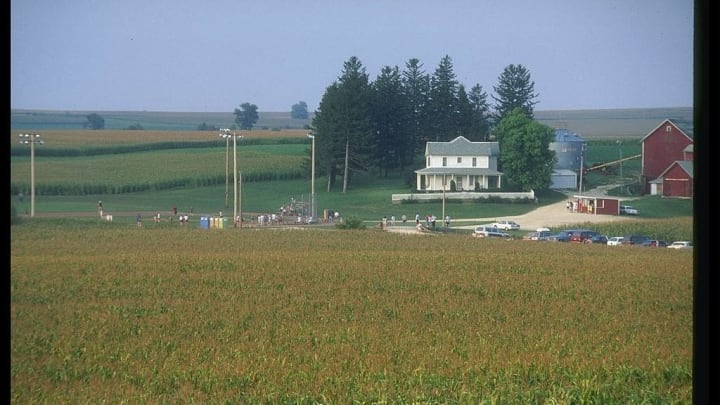I Love the Big, Dumb Field of Dreams
By Kyle Koster

I was 7-years-old the first time my picture appeared in the newspaper. There, on page whatever of Dubuque’s daily in April of 1991, was a toeheaded kid with a hat too big for his head, taking a swing with a wooden bat in a brown cornfield. There was no reporter on-site out in Dyersville, Iowa, site of the blessed plot of land known as the Field of Dreams. But a photographer dutifully took down my name, age, and why we were visiting the attraction, which was relatively new at that time.
It came as a great surprise, then, to see the finished product a few days later. My grandmother mailed the clip — as people did in those days — and in the cutline it got a bit fictitious. Someone wrote that my parents were guests on a riverboat casino floating out on the Mississippi River. They were not. Those who know them would, and still do, get a great kick out of it.
But that was pesky adult stuff. An example of how the message can get muddled, even a pure one like the Field of Dreams emits. To me, a wide-eyed kid who put baseball above all else, I had permanent proof of a perfect memory.
Kids grow up, of course, and begin to think critically. The Kevin Costner movie which made me cry had, in retrospect, some flaws. A groundswell of people felt emboldened to point these out and cause some reconsideration. My picture is in black and white but the cornstalks still look sad and dead. And then there’s the fatal error — an artistic liberty recasting my parents into a version unrecognizable.
But then kids come for grown-up kids and they watch the movie again. They consider what’s at the heart of it — a longing for more time with one’s father – through a new lens. The movie is sappy and perhaps overwrought, yes, but it’s also magic and taps into something pristine in the heart.
These are the thoughts rattling around in my grown-up head some 28 years after the newspaper photo. Major League Baseball has announced plans for a game next year between the White Sox and Yankees.
No, it’s not at the actual field. It’s a marketing idea, a cheap ploy at nostalgia. The analytical side of me wants to hold my heart back and not get excited about it.
The emotional side, though, is all in. It wants to embrace the feeling and the idealized version of it all with open arms. It wants to pay whatever it takes to get there.
The existence of this game creates an important question: is it just a game? Or is this Field of Dreams something more, something deeper. Opinions will vary and tell you a lot about that person and what stage of life they’re in.
The line between dreams and real-life was blurred almost three decades ago. It remains blurry today, and will be next summer. That’s not entirely a bad thing.